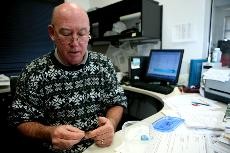The Arizona Poison and Drug Information Center on the UA campus may close as soon as February if a proposal before the Arizona Legislature is passed.
According to a proposal by the Joint Legislative Budget Committee, the UA poison center would lose $1.2 million in state funding, which makes up most of its entire budget.
The legislature would instead give an additional $300,000 to the Banner Poison Control Center in Phoenix, making it the sole provider for the state.
Jude McNally, managing director of the UA center for almost 25 years, said that currently the UA poison control center serves all of Arizona except Maricopa County, which is handled by the Phoenix poison control center at Banner Good Samaritan Medical Center.
He said that the UA center receives about 70,000 calls a year as opposed to the Banner center in Phoenix, which gets about 105,000 calls a year.
The UA center is free, confidential and employs pharmacists that are nationally certified poison specialists, McNally said. Each pharmacist is trained to answer questions about exposure to drugs, medicines, venomous insects and chemicals for private citizens as well as medical professionals.
He said that UA pharmacy and medical students work as interns in the poison center alongside medical professionals from outside the university, who train the interns to work on the phones.
McNally called it a “”unique opportunity … to invite medical students and pharmacy students and paramedics and all kinds of medical professionals to come and do experiential rotations in the center,”” an opportunity that would be lost should the center close.
Research into the scorpion antivenom called Anascorp would also be one of the programs eliminated.
The UA center has spent the last three years training over 200 nurses and physicians at 20 hospitals in Arizona to administer the drug to those stung by scorpions, McNally said.
More than 650 patients, most under the age of 5, have received Anascorp, and “”it has been life saving and dollar saving without any question,”” he said.
Most calls come in at times when people are unable to contact their family doctors.
Karen Giese, of Chino Valley, used the services recently when she was unsure about something her daughter had eaten. She wanted immediate help, something that she said is difficult to find because most doctor’s offices close on the weekends.
Barbara Dillon, of Tucson, said the same thing about her experience. She said she called the poison center a week ago when her son had accidentally taken too much of a prescription.
“”Doctors are not always readily available on the phones,”” Dillon said. “”A lot of people don’t have regular family doctors either.””
Most importantly, McNally said, the poison control center is saving the state money by eliminating the unnecessary use of emergency health services.
“”Emergency rooms are so overtaxed, so burdened in our current health care system,”” he said. “”To remove some of these patients, to be able to manage them safely at home, is a really cost-effective way to run health care.””
Dillon agreed and said she would have had to use emergency services if she hadn’t been able to call the Tucson poison control center.
“”I would have had to take him to the emergency room,”” Dillon said. “”It makes no sense to close a system that actually saves money.””









